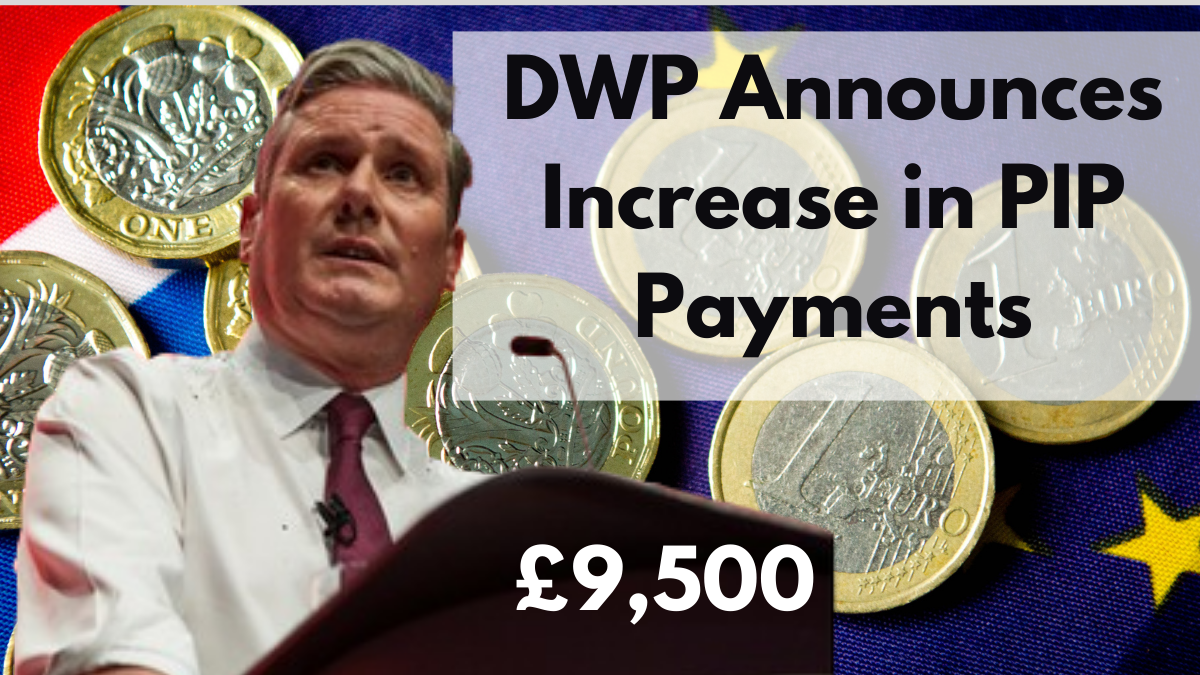The Department for Work and Pensions (DWP) has announced a significant increase in Personal Independence Payment (PIP), offering up to £9,500 in additional financial support to qualifying individuals. This adjustment is designed to aid those who experience mobility and daily living challenges due to long-term health conditions or disabilities.
The primary aim of this increase is to help alleviate the financial burdens that come with managing physical or mental health conditions. The government is committed to ensuring that vulnerable individuals receive the necessary support to maintain a good quality of life.

What is Personal Independence Payment (PIP)?
PIP is a government-funded benefit designed to assist individuals who struggle with daily activities and mobility due to long-term illnesses or disabilities. It is intended to provide financial relief for additional expenses incurred because of these health challenges.
The PIP payment is categorized into two components:
- Daily Living Component: Covers assistance with daily tasks such as cooking, dressing, and managing medications.
- Mobility Component: Supports individuals who require help moving around, either within their home or outside.
This latest increase ensures that claimants receive adequate financial aid to meet their essential needs.
Eligibility Criteria for the Increased PIP Payment
To qualify for the higher PIP payments, individuals must meet the following conditions:
| Eligibility Criteria | Description |
|---|---|
| Age Requirement | Be aged between 16 and the state pension age for more details Visit the official site |
| Health Condition | Have a long-term health condition or disability that significantly impacts their ability to carry out daily activities or mobility-related tasks. |
| Medical Evidence | Provide medical evidence confirming the condition has lasted for at least three months and is expected to persist for a minimum of nine months. |
| Assistance Need | Demonstrate a need for assistance in daily tasks, which may determine their eligibility for one or both PIP components. |
Claimants who require greater support may qualify for higher rates under the Daily Living and/or Mobility components.
How to Apply for the Increased PIP Payment
If you believe you are eligible for the enhanced PIP payment, follow these steps:
1. Verify Your Eligibility
Before applying, review the eligibility criteria to confirm that you meet the necessary conditions.
2. Submit an Application
Eligible individuals can submit a PIP application form to the DWP. Current recipients of PIP may have their cases automatically reviewed, meaning no additional application is necessary.
3. Undergo a Medical Assessment
In some cases, applicants may be required to attend a medical assessment. This evaluation determines how the condition affects daily activities, including mobility, meal preparation, and personal care.
4. Decision and Payment Processing
Once the assessment is complete, the DWP will determine eligibility and adjust the payment accordingly. Approved claimants will receive the increased amount in their payment cycle.
Payment Schedule and Amount Updates
The revised PIP payments are set to be implemented from an upcoming date (to be announced by the DWP). Eligible claimants will start receiving increased payments as per the updated schedule. To stay informed about the latest updates, beneficiaries can visit the official DWP website or check their online PIP accounts for real-time information.
Breakdown of PIP Payment Rates
| PIP Component | Standard Rate | Enhanced Rate |
|---|---|---|
| Daily Living Component | £[insert amount] per week | £[insert amount] per week |
| Mobility Component | £[insert amount] per week | £[insert amount] per week |
Note: The exact payment figures will be confirmed upon the official release by the DWP.
Key Benefits of the Increased PIP Payment
- Greater Financial Support: Helps cover increased living costs for individuals with disabilities or long-term illnesses.
- Reduced Financial Strain: Eases the burden of additional expenses such as mobility aids, home modifications, and healthcare services.
- Government Commitment: Reflects the government’s ongoing dedication to supporting vulnerable individuals.
- Automatic Adjustments: Existing PIP claimants may receive the increased payment without needing to reapply.
Final Thoughts
The decision by the DWP to increase PIP payments is a vital step in supporting individuals facing long-term health challenges. If you think you qualify for the enhanced benefit, ensure that you meet the eligibility criteria and provide the required documentation.
For existing claimants, the process should be seamless, with payments being adjusted automatically in most cases. Stay updated with official announcements regarding payment dates and amounts to ensure you receive the support you are entitled to without delays.
Frequently Asked Questions (FAQ)
1. When will the increased PIP payment take effect?
The DWP has yet to announce the exact date, but updates will be provided through official channels.
2. Do current PIP recipients need to reapply for the increased payment?
In most cases, no. The DWP will automatically review and adjust payments for eligible existing claimants.
3. How can I check the status of my PIP payment?
You can monitor your PIP payment details by logging into your online DWP account or contacting the PIP helpline.
4. Will all PIP claimants receive the full £9,500 increase?
The increase varies based on individual circumstances and eligibility under the PIP assessment criteria.
5. Can I appeal if my PIP claim is rejected?
Yes, if your application is denied, you have the right to request a mandatory reconsideration and, if necessary, appeal the decision.
For More Information Click Here
